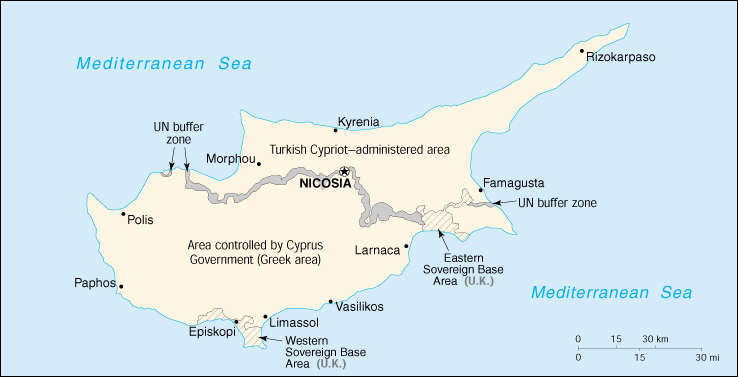
Status Quo Side: Turkish Cypriots
Non-Status Quo Side: Greek Cypriots
Region: Europe
Conflict Type: External Intervention
Issues in Dispute: Ethnic, Governance, Independence
Maps: [Cyprus relief map] [Cyprus relief map (reduced size)]

Independence from Britain after the long struggle over "enosis" (union with Greece) [see CYE] left sharp communal differences between Greek and Turkish Cypriots. The 1960 constitution gave the President (Greek-Cypriot Archbishop Makarios III) and Vice-President (Turkish- Cypriot Rauf Denktash) some veto powers, barred enosis and/or partition, and permitted two British bases and the stationing of Greek and Turkish troops.
President Makarios proposed constitutional changes designed to remove a bottleneck in government by curtailing the legislative powers of the T-Cypriots. T-Cypriot rejection provoked G-Cypriot anger and violent disputes.
Clashes between armed irregulars provoked severe communal fighting and the centralized administration collapsed. A Turkish invasion threat, plus Soviet objection to (and Cypriot rejection of) a NATO peace force, led to UNSC approval on March 4 of a peacekeeping force, UNFICYP, and a UN mediator. Renewed conflict included bombing raids from Turkey in August.
After pacification, both sides rearmed. The G-Cypriot request to end three-power guarantees renewed T-Cypriot fear of enosis.
The G-Cypriot National Guard touched off serious fighting. Turkish mobilization prompted a US-UN-NATO-sponsored mediation mission led by US deputy secretary of defense Cyrus Vance.
A threatened Turkish invasion was called off, and both Greece and Turkey agreed to withdraw all non-Cypriot forces, except UN peacekeepers, from the island. Direct communal negotiations began in 1968 but made little progress.
After the death of enosis-advocate rebel G-Cypriot Gen. George Grivas in January 1974, G-Cypriot troops in July overthrew the government led by Archbishop Makarios, who then charged the Greek military government with complicity in the coup. Fearing enosis, Turkish forces invaded and occupied 45% of the island.
The T-Cypriots, with one-fifth of the populace and per capita income one-third of Greek Cyprus, in 1983 declared 37% of the island the "Turkish Republic of Northern Cyprus," recognized only by Turkey. UN mediation under Diego Cordovez featured a proposal, rejected by the T-Cypriots, for a bizonal federation in which each community would retain a majority in areas it controls.
The situation escalated when in January, 1997 G-Cyprus announced purchase of Russian S-300 anti-aircraft missiles, which Turkey threatened to bomb if installed. Prospects were further dimmed by the European Union's decision in December, 1997 to put off Turkey's membership application but opening talks in April 1998 on membership for Cyprus. T-Cypriots rejected an invitation to be part of the Cypriot negotiating team. Tensions increased in June 1998 with Greece and Turkey competitively deploying warplanes on the island. UNFICYP contrinued to patrol the "Green Line." While stepped-up UN and US mediatory efforts continued, in July,1999 Turkish Prime Minister Bulent Ecevit (who had ordered the Turkish invasion in 1974) ruled out any return to Cypriot unity.